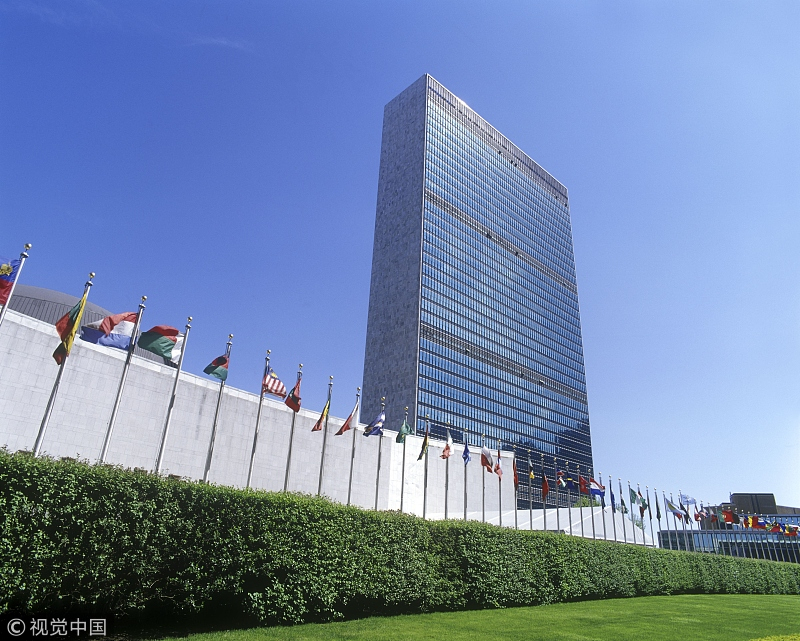Editor's note:Jiang Shixue is a professor at the Institute of Global Studies at Shanghai University. The article reflects the author's opinions, and not necessarily the views of CGTN.
International relations theory asserts that the world is always in a state of anarchy because there is no global government in charge of all worldwide issues.
In reality, although we have the United Nations (UN), which was founded in 1945 and now encompasses 193 member states, it does not play the role of a global government. Sometimes, it fails to meet the expectations of its members.
For instance, its main purpose is to resolve issues between countries through diplomacy before they go to war. Unfortunately, wars of different scales frequently break out. That is why the UN is often viewed "useless."
However, describing the UN as “useless” is exaggerated and even incorrect. As a matter of fact, this international organization has been trying its best “to achieve international co-operation in solving international problems of an economic, social, cultural, or humanitarian character, and in promoting and encouraging respect for human rights and for fundamental freedoms for all without distinction as to race, sex, language, or religion,” as outlined in its Charter

United Nations headquarters building in New York City, the United States /VCG Photo
From organizing peacekeeping missions to implementing the Millennium Development Goals and then the Sustainable Development Goals, from promoting South-South and North-South cooperation to implementing its Development Program, World Food Program and Environment Program, and from offering humanitarian and development assistance to children and mothers through its Children's Fund (UNICEF) to recognizing World Heritage Sites by its Educational, Scientific and Cultural Organization (UNESCO), the UN has done a good job in improving the welfare of humankind.
Furthermore, the UN is well credited with sticking to multilateralism, and recent developments in international relations have proven that multilateralism is superior to unilateralism in the following aspects:
- It encourages the participation of developing or weak nations in world affairs, including maintaining world peace and development, making or revising international rules, pushing forward global governance, etc. That is to say, these nations should have an equal say on any issues that affect humanity.
- It supports the principle of common but differentiated responsibility. It is agreed that, on climate change and many other important matters, both developed and developing countries need to undertake common responsibility, but the responsibility should be differentiated.
- It opposes hegemonism and power politics, which only reflect the interests of the powerful nations in dealing with global issues or resolving disputes.

Pakistani schoolchildren attend a class at a government school on International Literacy Day in Quetta on September 8, 2015. Pakistan's literacy rate is 58 percent, and the country looks set to miss its education millennium development goals. /VCG Photo
- It benefits globalization by fostering cooperation. One of the most conspicuous characteristics of globalization is the rapid movement of people, investment, goods, technology and even ideas across borders, entailing cooperation, not confrontation, among nations at different development levels. As multilateralism is based on cooperation, any effort to rev it up can be a building block for globalization.
Some international commentators argue that China is active in pushing the world toward a new international order. This observation is correct. As a permanent member of the UN Security Council and the second largest economy with almost 1.4 billion people, China longs to play an important role in transforming today's not-so-good world order.
China always supports the development of multilateralism, not only in words, but also in deeds. For instance, China has put forward the Belt and Road initiative. This initiative calls for policy coordination, infrastructure connection, trade facilitation, financial cooperation and people-to-people exchanges among all countries in the world. Therefore, it contributes to the development of multilateralism.

Desert in northwest China's Gansu Province /VCG Photo
In the five years since its birth, the Belt and Road Initiative (BRI) has attracted great attention and participation from many countries and regions, with remarkable progress.
Apart from the BRI, China has also created the ambitious idea of building a community of a shared future for mankind. When the construction is completed, humans will live in a world supported by five pillars: peace, security, economic prosperity, cultural harmony and a sustainable environment.
As every nation needs to contribute to this community, the whole process to attain this objective can benefit multilateralism.
Therefore, multilateralism is better than unilateralism and it serves the interest of every nation. That is why both the UN and China support it.
(Cover Photo: The UN flag flies ahead of the official opening of the 73rd United Nations General Assembly in New York City, September 24, 2018. /VCG Photo)
(If you want to contribute and have specific expertise, please contact us at opinions@cgtn.com.)
https://news.cgtn.com/news/3d3d414e314d444e7a457a6333566d54/share_p.html?from=timeline
